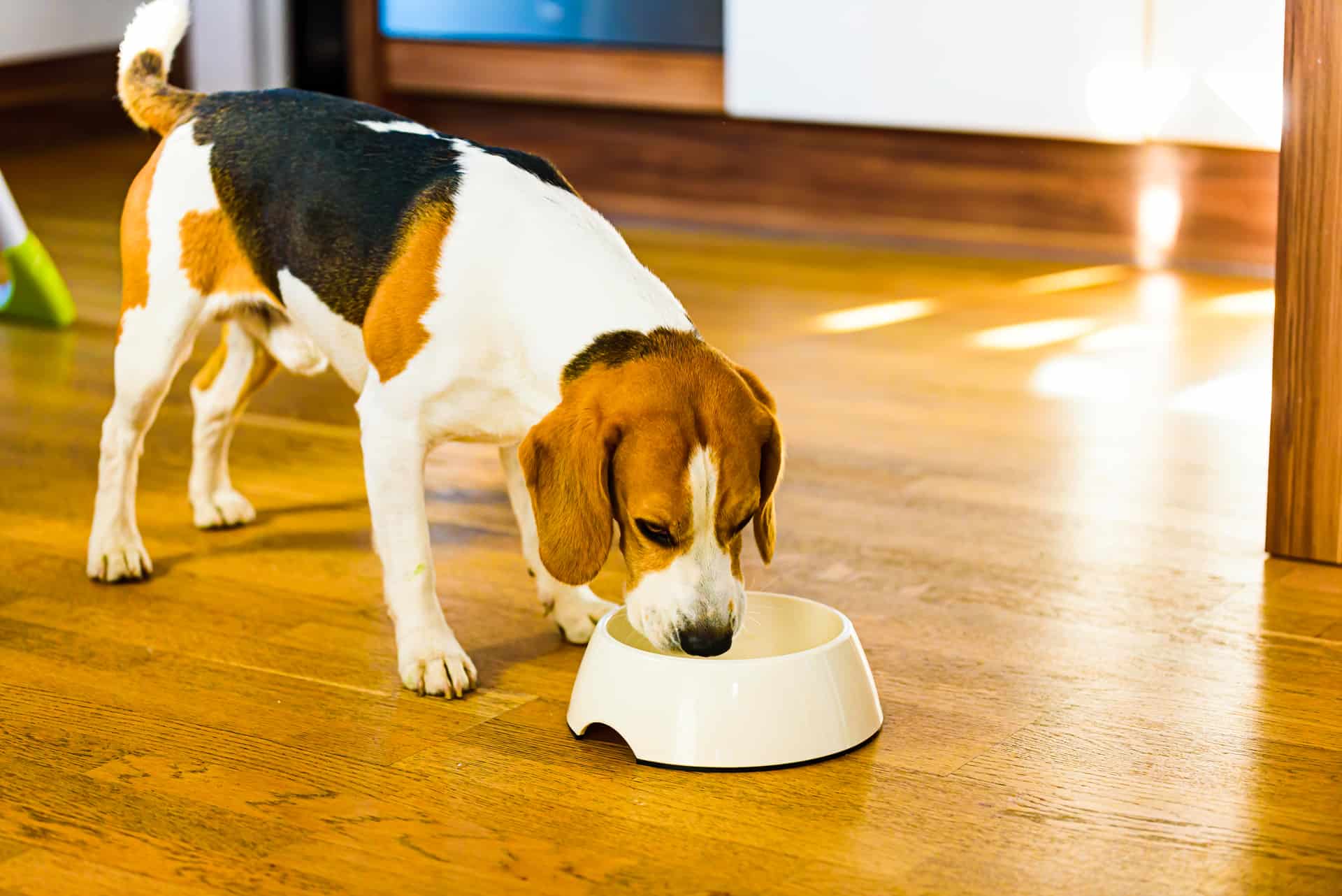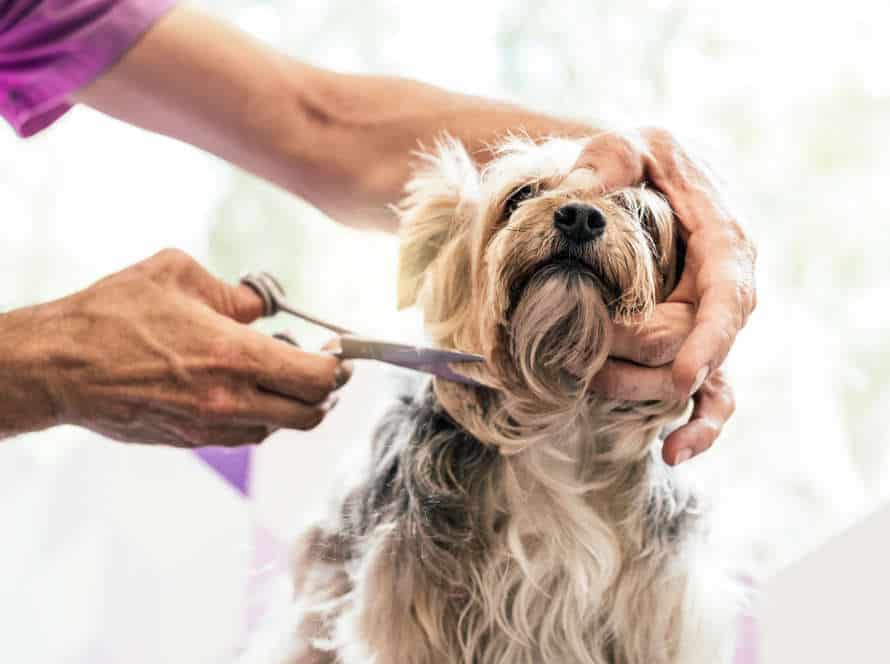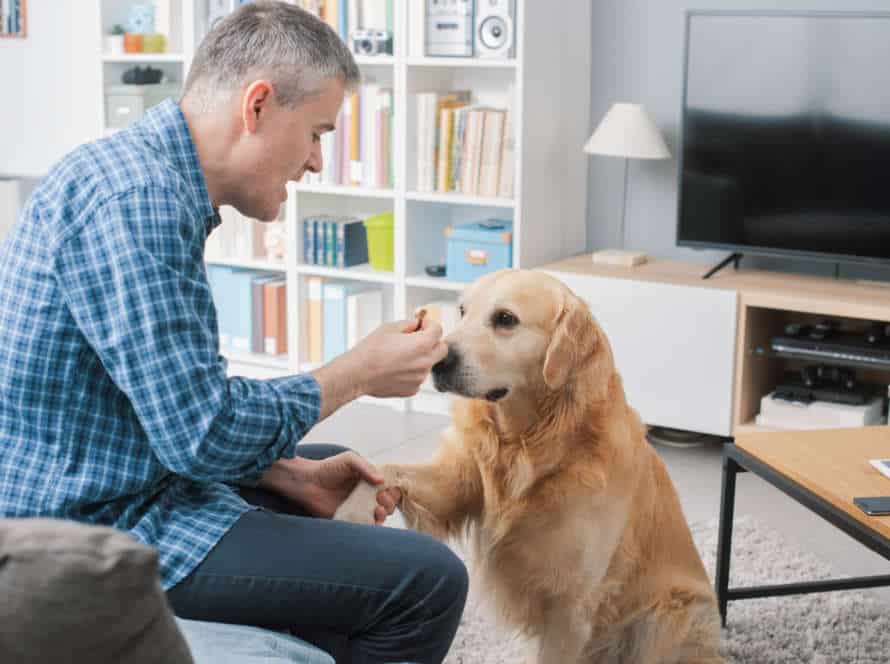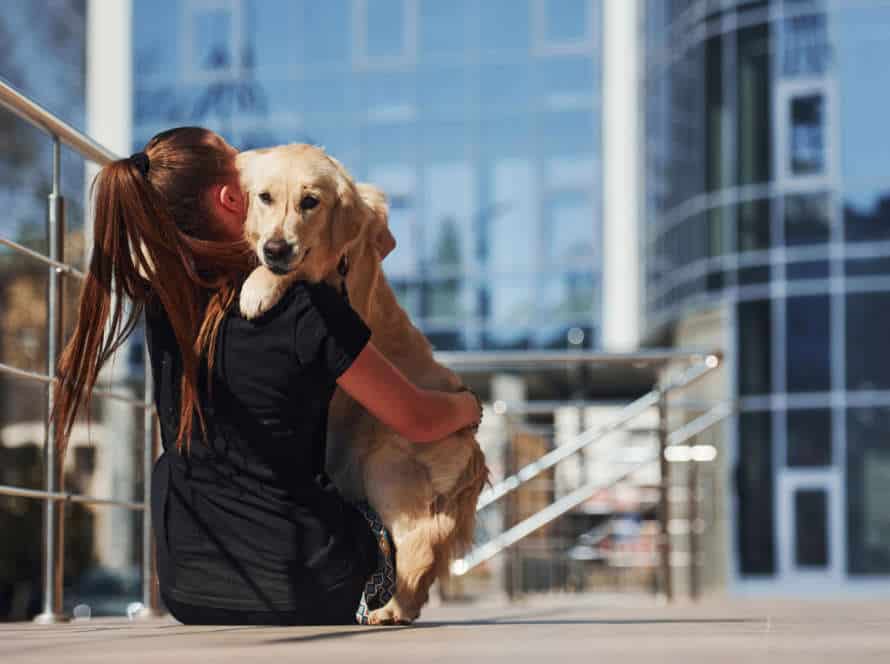The Importance of Balanced Nutrition for Your Dog
Balanced nutrition is essential for your dog’s health and wellbeing. Like us humans, dogs need various nutrients to stay healthy and full of energy. Here are the key benefits of a balanced diet:
- Weight management: A balanced diet helps keep your dog’s weight at an optimal level and prevents obesity-related issues.
- Better digestion: Proper nutrition assists your pup’s digestive system, promoting regular bowel movements and avoiding constipation.
- Strong immune system: A balanced diet provides your dog with essential vitamins, minerals, and antioxidants to support a healthy immune system and ward off diseases.
- Increased energy: A healthy diet gives your pup the energy they need to stay active, avoiding health problems related to a sedentary lifestyle.
Pro tip: Talk to your vet to determine the best diet and feeding routine for your dog based on their age, breed, and health status.
Understanding Your Dog’s Nutritional Requirements
Nutrition is essential for your pup’s health and happiness. The right mix of nutrients, minerals, vitamins and proteins is needed to keep them in great condition. It’s important to know your dog’s nutritional requirements and how to fulfill them through their diet. In this article, we’ll explore the basics of feeding and nourishing your precious pup!
Protein
Proteins are a must for a pup’s healthy growth. Proper nutrition is crucial for keeping them fit and active. Proteins construct and fix tissues and muscles in their body. They also make enzymes, hormones, and antibodies essential to their overall health.
Dogs need a lot of protein. High-quality sources like chicken, beef, fish, and turkey are great. Plant-based sources like lentils and peas can also be added.
It’s important to feed them a balanced diet with the right amount of protein, carbohydrates, fats, vitamins, and minerals. Too much or too little protein can cause health issues, such as obesity, muscle wastage, and kidney problems. Check with your vet to figure out the right nutritional needs for your dog.
Pro tip: If you give your dog high protein food, make sure they drink plenty of water to protect their kidneys.
Carbohydrates
Carbs are must-haves for your pup’s diet. Here’s how they help:
- Energy: Carbs give your pup the fuel they need to stay active.
- Fiber: They contain fiber, which keeps your pup’s digestive system moving.
- Weight control: Add bulk to their diet without too many calories.
- Brain: Carbs provide the glucose that keeps their brain and nervous system healthy.
But, not all carbs are equal. Go for complex ones like sweet potatoes, oatmeal and brown rice. Avoid simple carbs like sugar and corn syrup.
Fats
Fats are essential for your dog’s nutrition. They provide energy, help absorb vitamins, and support healthy skin and coat. However, it’s important to make sure their diet contains the right amount of fats. Too much can lead to weight gain, and too little can cause dry and itchy skin, dandruff, and a dull coat. The perfect fat balance depends on the age, breed, activity level, and other factors. So, talk to a vet and create a diet plan for your pup.
Healthy fats come from foods like salmon, flaxseeds, chicken, and olive oil. Remember that even healthy fats are high in calories. So, watch their portion size to avoid overconsumption.
Vitamins and Minerals
Vitamins and minerals are essential for your pup’s health. They boost immunity, energy, and organ functioning. Here are some important ones for Fido:
- Vitamin A: Good for eyeballs, skin, and immunity. Animal sources, like liver or fish oil, are best.
- Vitamin D: This mineral is vital for strong bones and teeth, and helps dogs absorb calcium and phosphorus. Sunlight and fatty fish are great sources.
- Calcium: Necessary for bones and teeth, muscles, and nerve transmission. Dairy, leafy greens, and bone meal are good sources.
- Iron: Helps produce hemoglobin which carries oxygen to cells. Red meat, liver, and eggs are good sources.
- Zinc: Healthy skin, coat, and immunity. Meat, dairy, and whole grains are good sources.
Too much or too little of any vitamin or mineral can be harmful. Get advice from a vet to determine the right amount and sources for your pup’s diet.
Choosing the Right Dog Food
It is essential to pick the perfect food for your canine companion! This food is the primary source of nutrition and must be balanced, giving them all the necessary nutrients. Let’s discover why this is so important and the advantages of doing it right!
Commercial Dog Food
Choosing the correct commercial dog food can make a major difference to your pup’s health and happiness. Balanced nutrition is key for good health and cutting down the danger of illnesses.
Here are some tips for choosing commercial dog food for your canine companion:
- Pick food made for their age (puppy, adult, senior).
- Look for food with top-notch protein sources such as meat, fish, or eggs to fulfill their amino acid needs.
- Pick dog food with healthy fats to get a glossy coat, good skin, and to help brain development.
- Check for important vitamins and minerals like calcium, zinc, B vitamins, and antioxidants that boost their immune system and health.
- Think about any specific needs or preferences your pup may have e.g. grain-free diet or a sensitive stomach.
Remember, a great diet is vital for keeping your pup healthy and active. Ask your vet if you have any queries or worries about your pup’s nutrition needs.
Pro tip: Always examine the ingredients list and the nutritional info on the back of the packet before buying commercial dog food.
Reading Labels
Reading labels is key to choosing the right food for your pup. Here’s how to make sense of them:
- Start with the ingredients. Look for real proteins like chicken, beef, or fish as the main ingredient. Avoid “meat meal” or “by-product.”
- Check the guaranteed analysis. Make sure the protein, fat, and fiber content fits your dog’s needs.
- Look for certification. Ensure the manufacturer’s claims are backed up by certifications (e.g. from AAFCO) showing that the food meets standards.
- Avoid fillers. Use food with healthier fillers like grains and vegetables; steer clear of those with lots of corn, soy, and rice bran.
By reading the label, you can find the best food for your four-legged friend that provides balanced nutrition, keeps them healthy, and extends their life.
Recognizing Nutritional Claims
When picking dog food for your pup, it’s key to know what nutritional claims mean. Here’s the lowdown on a few common ones:
- “Complete and balanced”: This means the grub meets AAFCO’s minimum nutrition standards for dogs.
- “Grain-free”: This suggests no grains, which some canines may be allergic to. Not necessarily healthier, though.
- “Natural”: This implies no artificial colors, flavors or preservatives. Could still contain other additives or not be nutritionally balanced though.
- “Organic”: Meaning the food is made with ingredients grown without pesticides, fertilizers or GMOs.
By understanding these claims, you can choose the right food for your pup that meets their nutritional needs.
Homemade Dog Food
Homemade dog food is ideal for ensuring your pup gets the nourishment they need. But, it’s important to pick the correct ingredients and ensure the food is balanced. Here are some tips:
- Include lean proteins like chicken, turkey, and beef, plus veggies like carrots, green beans, and sweet potato. Avoid onions, garlic, avocados, and other toxic ingredients.
- Whole grains such as brown rice or quinoa will provide fiber and energy.
- Add essential fatty acids such as omega-3 and omega-6 for a healthy skin and coat.
- Also, check with your vet about the right portion size and make sure the food is nutritionally sound for your pup’s needs.
- And here’s a pro tip: Gradually introduce new foods to prevent digestive issues!
Consult with a Veterinary Nutritionist
Consulting a vet nutritionist is key to ensuring your pooch’s diet is meeting their nutritional needs. They can aid in picking the correct dog food by assessing your pup’s health, breed, age, and activity level. A vet nutritionist can also provide help for special diets for dogs with health conditions.
Here’s why consultation with a vet nutritionist matters:
- A balanced diet can keep your pup’s weight, digestive health and fortify their immune system.
- A nutritionist can detect any potential nutritional deficiencies in your dog’s current diet.
- A specialist can direct you in selecting suitable commercial dog food, treats, and supplements.
- If your pup has a health issue, a vet nutritionist can team up with your vet to create a custom diet that can manage or improve their condition.
Selecting the right dog food can be tough, but consulting with a nutritionist can make a huge difference in your pet’s life.
Pro Tip: Always check the ingredients list on commercial dog food, and dodge products with low-quality fillers, by-products, and artificial preservatives.
Choosing Ingredients
Choosing the right food ingredients for your pup is essential for their overall health and wellbeing. Here’s help to make informed choices:
- Look for proteins such as chicken, lamb, fish, or beef as the main ingredient.
- Opt for whole grains like brown rice, barley, and oatmeal rather than refined grains.
- Steer clear of filler ingredients like corn, wheat, and soy, as they provide little nutrition and can cause allergic reactions in some dogs.
- Add in fruits and veggies like carrots, sweet potatoes, spinach, and blueberries to get essential vitamins and minerals.
- Check the label and search for AAFCO (Association of American Feed Control Officials) certification to guarantee the food meets nutritional standards for your pup’s age.
By selecting high-quality ingredients, you can be sure your pup’s diet is balanced and meets their nutritional requirements.
Identifying Nutritional Deficiencies in Your Dog
Nutrition is a must for our loyal doggie pals. Poor or imbalanced nutrition can cause nutritional deficiencies in our furry buddies, which can be harmful to their health. Knowing how to identify and stop nutritional deficiencies in your pup is essential. Here we’ll look at how to recognize signs of nutritional deficiencies and how to correct it in your beloved dog.
Common Nutritional Deficiencies
Our pets need a balanced diet to stay healthy; however, nutritional deficiencies can still happen. These are some of the most common in dogs:
- Protein: Vital for building muscles and tissues. Not enough can cause muscle loss, slow growth, and weak immunity.
- Vitamins: Different vitamins are essential for a dog’s wellbeing. Vitamin D helps calcium absorption & bone growth. Vitamin A keeps skin & coat healthy. Deficiencies can lead to vision problems, weak immunity, and odd bone growth.
- Minerals: Minerals like calcium, phosphorus, and potassium must be in certain amounts. If not, bones become brittle, anemia, and nerve problems happen.
A balanced diet with high-quality protein, vitamins and minerals can help avoid these deficiencies.
Recognizing Signs of Nutritional Deficiencies
Balanced nutrition is key for your pup’s health and well-being. But, it can be tricky to spot nutritional deficiencies in your dog. Here are some common signs to look for:
- Skin dry and itchy
- Dull coat, hair loss
- No appetite or weight loss
- Diarrhea or constipation
- Low energy, lethargy
- Aggression, depression (behaviour changes)
- Poor growth and development (for young dogs)
- Easily gets infections.
If you notice any of these signs, go to your vet right away. Your vet can help pinpoint the cause and suggest a special diet or supplements. Good nutrition is super important for your dog’s health and happiness.
Addressing Nutritional Deficiencies
Nutrition deficits in your pup can cause serious damage to their wellness. It’s essential to spot any possible deficiencies and take action to ensure they have a balanced, nutritious diet.
Signs of nutritional shortages in dogs can include: vomiting, diarrhea, loss of appetite, skin issues, and laziness. To figure out if there are any deficiencies, consult a vet. They may advise a blood test or dietary examination.
Giving your dog a balanced diet is necessary for their health. Include proteins, fats, carbohydrates, vitamins, and minerals in the right proportions. Depending on their age, size, breed, and activity level, the nutrient needs could differ.
Feeding your pup high-quality food and healthy treats can help keep their health up and reduce the likelihood of nutrition shortages. In some cases, supplements may be required, yet only under the direction of a vet.
Tips for Maintaining a Balanced Diet for Your Dog
It’s essential to keep your pup’s nutrition balanced for their health and happiness. Providing vital vitamins and minerals and not overfeeding – these are just a few steps you can take to guarantee your dog gets the balanced diet they need. We’ll look at the importance of balanced nutrition for your dog and give tips to maintain it.
Feeding Schedule
Feeding your pup a balanced diet is super important for its health. Here are some tips to make sure your pup is getting the nutrition it needs:
- Stick to a regular schedule, with two to three smaller meals rather than one big one.
- Choose high-quality dog food, based on breed, size, age and activity levels.
- Include lean proteins, whole grains, fruits, and veggies in meals.
- Avoid feeding table scraps and human food – they’re often too high in fat and salt.
- Check with your vet if your dog has dietary restrictions or allergies.
Providing a balanced diet helps keep your pup healthy, so make sure they get all the vitamins and minerals they need!
Portion Control
Maintaining a balanced diet for your dog is vital to keep them healthy and full of energy. Overfeeding can lead to obesity, heart disease and other issues. Underfeeding results in lack of energy and malnutrition.
Here are some tips:
- Work out nutritional requirements based on breed, age, and weight.
- Choose high-quality dog food with balanced nutrients and portion sizes.
- Do not give table scraps – this can lead to overfeeding and obesity.
- Do not free-feed – this can cause excessive eating and weight gain.
- Give treats in moderation and include them in daily food intake.
- Check with your vet for specific dietary requirements.
A balanced diet plus proper portion control are essential for your dog’s health and life.
Treats and Supplements
Treats and supplements can be a nice addition to your pup’s diet. Though, they should not replace a balanced and nutritious meal plan.
Keep these tips in mind:
- Treats should not exceed 10% of your doggy’s daily calorie count.
- Choose treats that have natural ingredients, like real meat, fruit, and veg. Avoid those with fillers, artificial colors and lots of sugar!
- For added health benefits, try omega-3 fatty acids, probiotics, and joint health supplements, but only after consulting with your vet.
- Make sure your pet’s diet includes lots of protein, fat, vitamins, and minerals.
Note that each pooch has different nutritional needs, depending on their breed, age, weight, and activity level. Ask your vet for the best diet plan for your pup!
Conclusion: The Importance of Balanced Nutrition for Your Dog
To sum up, giving your pup a balanced and nourishing diet is important for their overall wellness. A balanced diet should have a mix of protein, carbs, healthy fats, vitamins and minerals. It needs to be suited to the breed, age and lifestyle of your dog. Not eating right can cause many health issues such as obesity, heart problems, diabetes and digestion issues. Speak to your vet about what your dog needs nutritionally and buy high-quality food that gives them the best nutrition. Investing in your dog’s nutrition means they can have a happy and long life.
Frequently Asked Questions
1. What is balanced nutrition for dogs?
Balanced nutrition for dogs means providing them with a complete and balanced diet that contains all the necessary nutrients in appropriate quantities to ensure their overall health and well-being.
2. Why is balanced nutrition important for my dog?
Feeding your dog a balanced diet ensures that they get all the necessary nutrients they need to maintain good health and prevent health problems. A balanced diet can improve your dog’s immune system, help maintain a healthy weight, and increase their lifespan.
3. What are the key nutrients my dog needs?
Your dog needs a variety of nutrients, including protein, carbohydrates, fats, vitamins, and minerals. These nutrients are necessary for a healthy coat and skin, strong bones and teeth, and overall metabolic health.
4. How can I ensure my dog’s diet is balanced?
You can ensure your dog’s diet is balanced by feeding them high-quality commercial dog food that meets the AAFCO (Association of American Feed Control Officials) standards. You can also work with your veterinarian to create a custom diet plan based on your dog’s specific nutritional needs.
5. Can I give my dog human food as part of their diet?
While some human foods are safe and even offer nutritional benefits for dogs, many can be harmful or even toxic. It is best to consult with your veterinarian before giving your dog any human food to ensure its safety and nutritional value.
6. What are the consequences of an imbalanced diet for dogs?
An imbalanced diet for dogs can lead to a range of health problems, including obesity, dental disease, coat and skin problems, digestive issues, and even organ failure. A balanced diet is crucial for maintaining good health and preventing these issues.







